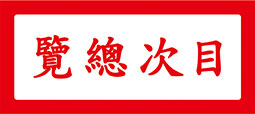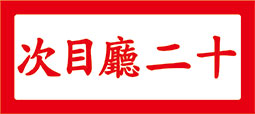On 12th February, 伍仟年 Chinese-Heritage Virtual Museum introduced “Liang Ch’i-chao and the Garden of Myriad Lives Gathering” to our readership. A close friend of the author, Mr. Ch’e Shou-t’ung, after reading this article, immediately wrote a piece in the middle of the night with the title: A Response to Shu Kong’s Article “Liang Ch’i-chao and the Garden of Myriad Lives Gathering” and forwarded it to us. It described in detail the custom of Hsiu-hsi (脩禊) amongst the literati who arrived in Taiwan after the fall of mainland China, attestation of the continuation of classical culture in this land. Before, Mr. Ch’e held the position of Deputy General Manager at the Central Daily News. Now, he is a well known author. It is genuinely difficult to meet a knower of the sound, a response from someone who empathizes. This is not just a blessing to the author, but a blessing to 伍仟年 Chinese-Heritage Virtual Museum as well.
Curatorial and Editorial Department
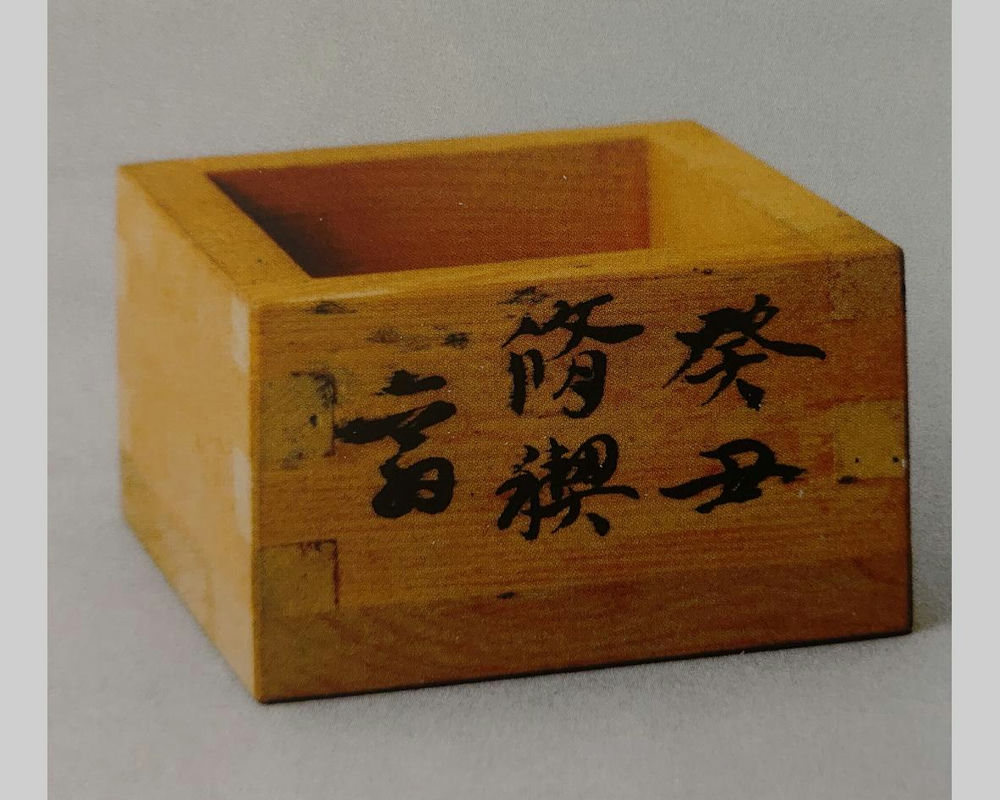
Inscription on a wooden cup by Chuang Yen for the 1973 Hsiu-hsi gathering. Photograph courtesy Mr. Chuang Ling
My teacher Mr. Chuang Yen (莊嚴 1899-1980), tzu Mu-ling, Deputy Director of the National Palace Museum, was a scholar who cherished tradition. Mr. Chuang Yen relished drinking, and mingled it with culture. He promoted the custom of Hsiu-hsi (脩禊), a clear testimony of the assimilation of drinking and festivity.
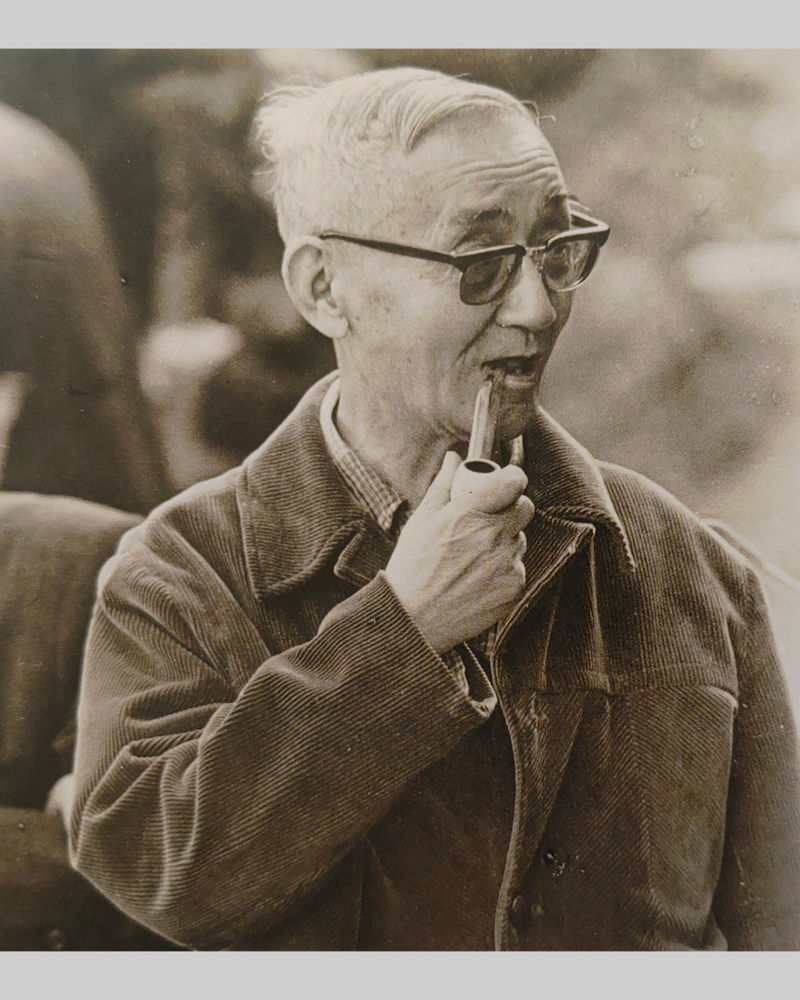
Portrait of Chuang Yen, Deputy Director of the National Palace Museum. Photograph courtesy Mr. Chuang Ling
I once read the Biography of P’u Hsin-yü (溥心畬傳) by Mr. Wang Chia-ch’eng (王家誠). P’u Hsin-yü took part in the custom of Hsiu-hsi on 3rd March, and the Festival of Chung-yang (重陽節) on 9th September. Most likely, the literati of his generation tried their utmost to safeguard the disappearing social customs. Mr. Chuang Yen had similarly studied the Hsiu-hsi gathering in the 2nd year of the Republic (1913), the 1st kuei-ch’ou (癸丑) year of the Republic. The gathering was attended by Liang Ch’i-chao (梁啓超 1873-1929) at the San-p’ei-tzu Garden outside Hsi-chih-men in Peking. The Garden was the former garden-house of Fu K’ang-an (福康安 1753-1796), and now the Zoo of Peking.
In the 35th year of the Republic (1946), after China’s victory over the Sino-Japanese War, and before most of the civil servants returned to the capital Nanking, Mr. Chuang Yen with his colleagues at the National Palace Museum, enacted the custom of Hsiu-hsi at Nan-wen-ch’üan in Chung-ch’ing. Mr. Chuang Yen had previously verified, in the 39th year of the Republic (1950), Yü Yu-jen (于右任 1879-1964), Chia Ching-te (賈景德 1880-1960), Huang Ch’un-ch’ing (黃純青 1875-1956) and others enacted the custom of Hsiu-hsi at the New Lan-t’ing Pavilion in the Shilin residence of President Chiang Kai-shek. In the 42nd year (1953) and the 44th year (1955) of the Republic, Yü Yu-jen again enacted the custom of Hsiu-hsi. Mr. Chuang Yen, with some regret, was not invited as he was staying at Pei-kou in Taichung. In the 52nd year of the Republic (1963), Mr. Chuang Yen invited his literary friends to enact the custom of Hsiu-hsi at Pei-kou, Wu-feng in Taichung. It was a refined gathering of drinking by a flowing stream. The Occidental Sinologist Richard Edwards was also invited.
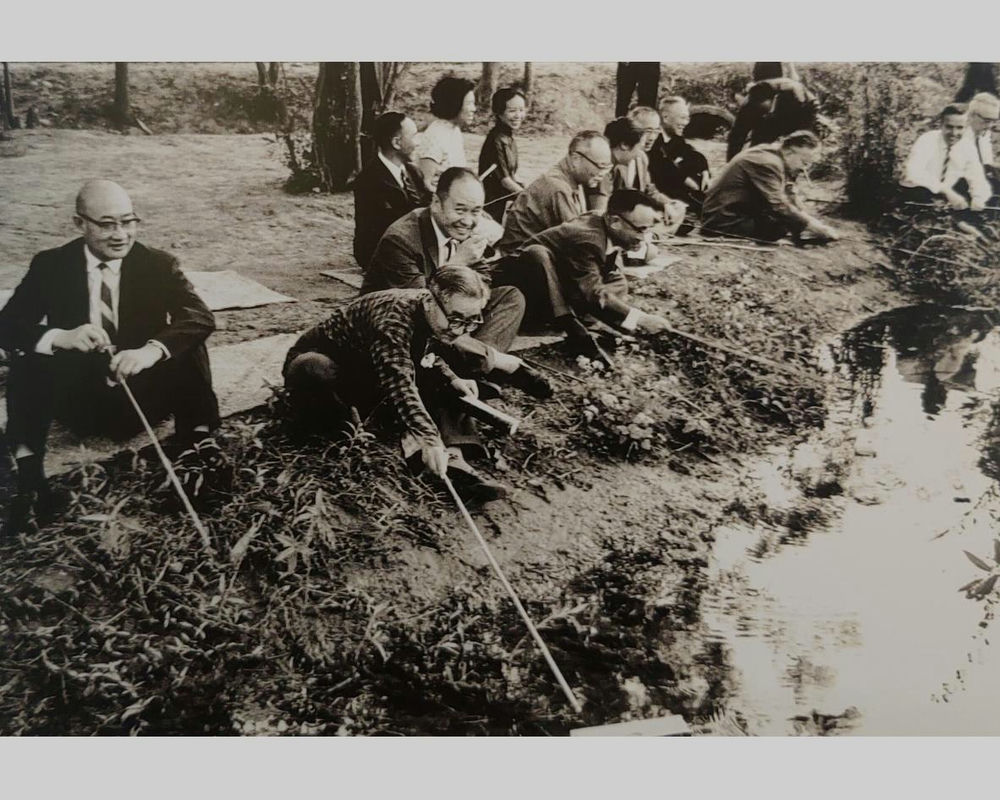
Chuang Yen and his literary friends at the 1963 Hsiu-hsi gathering in Taichung. Photograph courtesy Mr. Chuang Ling
The younger son of Mr. Chuang Yen, Chuang Yin (莊因), recalled that shortly before the despatch of the museum antiquities holdings to Taipei, his father took advantage during the inventory work, when Chinese and Occidental scholars convened together at P’ei-Kuo, Wu-feng. On 3rd March of the Chinese Agricultural Calendar, he invited everyone to the meander of a stream, under a hill slope by a bamboo grove, to take part in the custom of Hsiu-hsi. At that time, his father did not have the floating lacquer ear-cups of the ancients in his house, moreover, the flow of the stream was too rapid. So instead, his father used the square wooden cups for drinking sake he brought back from a calligraphic tour to Japan. The wine, the food, the utensils were prepared by the mother and Ch’en Hsia-sheng (陳夏生), wife of the fourth son Chuang Ling (莊靈). Although the gathering was outdoors, all the invited guests were exuberant, indulging in poetry and wine, holding the cups to converse on art, it was a most animated occasion.
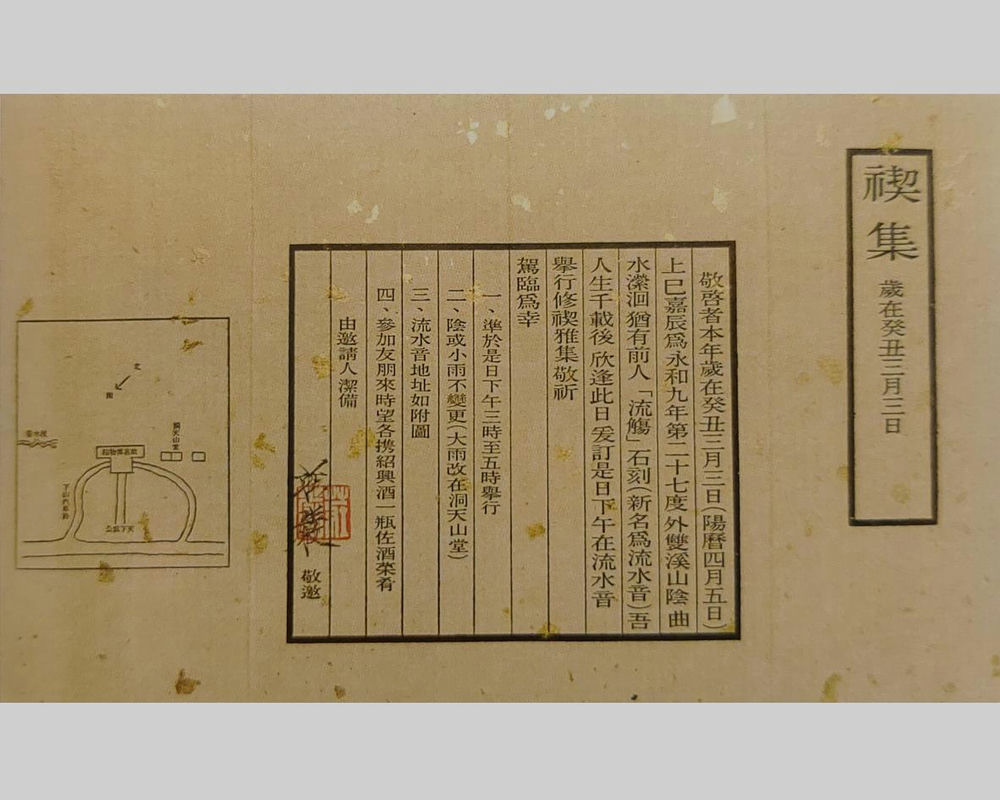
Invitation to attend the 1973 Hsiu-hsi gathering in Taipei from Chuang Yen. Photograph courtesy Mr. Chuang Ling
On 5th April, in the 62nd year of the Republic (1973), 2nd kuei-ch’ou year of the Republic, exactly the 27th kuei-ch’ou year of the sexagenary cycle, or one thousand six hundred and twenty years after the legendary literary gathering instigated by Wang Hsi-chih (王羲之 303-361) to perform the custom of Hsiu-hsi at Lan-t’ing, Mr. Chuang Yen chose to enact the custom of Hsiu-hsi by the hillside on the right of the National Palace Museum at Wai-shuang-hsi. He named the event the Refined Gathering of Liu-Shang. He invited T’ai Ching-nung (臺靜農 1902-1990), K’ung Te-ch’eng (孔德成 1920-2008), Liu Yen-t’ao (劉延濤 1908-1998), Wang Chuang-wei (王壯爲 1909-1998), Tseng Shao-chieh (曾紹杰 1910-1988), Hsia Te-i (夏德儀 1910-1918), Chin Ch’in-po (金勤伯 1911-1998), Hsia Ch’eng-ying (夏承楹 1910-2002), Lin Hai-yin (林海音 1918-2001), Chang Fo-ch’ien (張佛千 1907-2003), Chiang Chao-shen (江兆申 1925-1996), Huang Chao-heng (黃肇珩), Fu Shen (傅申) and others, a total of forty two, the same number of invitees as the gathering at Lan-t’ing. Coincidentally, an engraved stone with the characters liu-shang (流觴) was discovered by the stream adjacent to the museum, a relic from past enactment. This attached a great story for the gathering. Mr. Chuang Yen used square wooden drinking cups made of yellow juniper, and everyone was immersed in the bygone aura of antiquity.
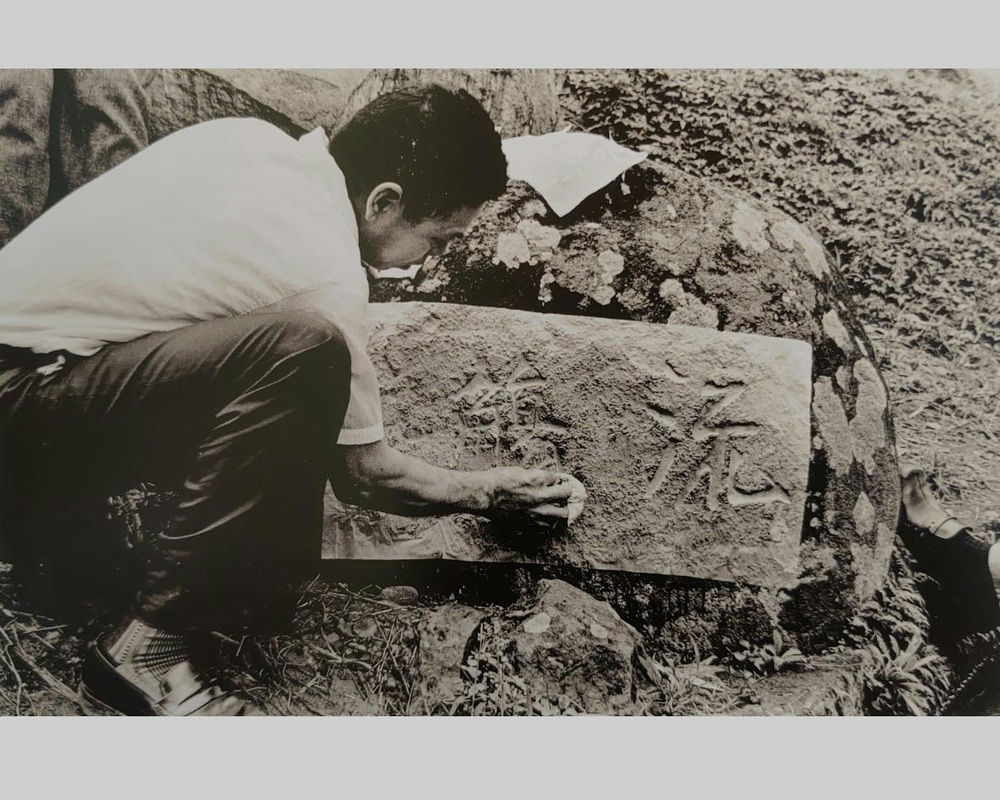
A stone tablet engraved with the words liu-shang (流觴) was discovered by Chuang Yen beside a stream next to the National Palace Museum in 1973. Photograph courtesy Mr. Chuang Ling
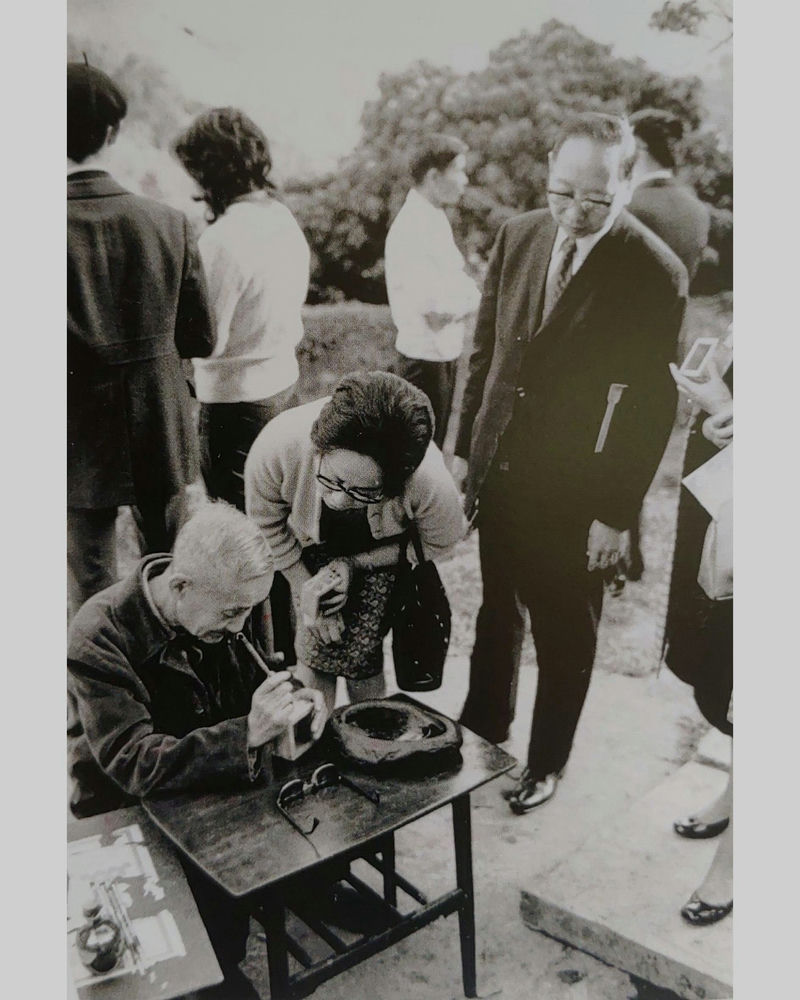
Chuang Yen writing calligraphy on wooden cups for the 1973 Hsiu-hsi gathering in Taipei. Photograph Courtesy Mr. Chuang Ling
In his article A Record of the Flowing Sound Hsiu-hsi Gathering at Shih-lin, Mr. Chuang Yen wrote:
“One must drink wine at Hsiu-hsi gathering. There are traditional ways on how to drink. It is very distinct. One must stay at the meander of a stream, the flow must not be rapid nor broad. Unlike the average banquet, there is no one to serve. The cups float on the water surface towards the drinker, and the drinker reaches out. After finishing drinking, the drinker returns the cup to the water, and it flows away, hence the name liu-shang. For this gathering, all the utensils, wine and food were restricted to the traditional products of our country, anything new and foreign were disallowed. Therefore there was no cigarette, no coffee, let alone brandy to treat the guests.”
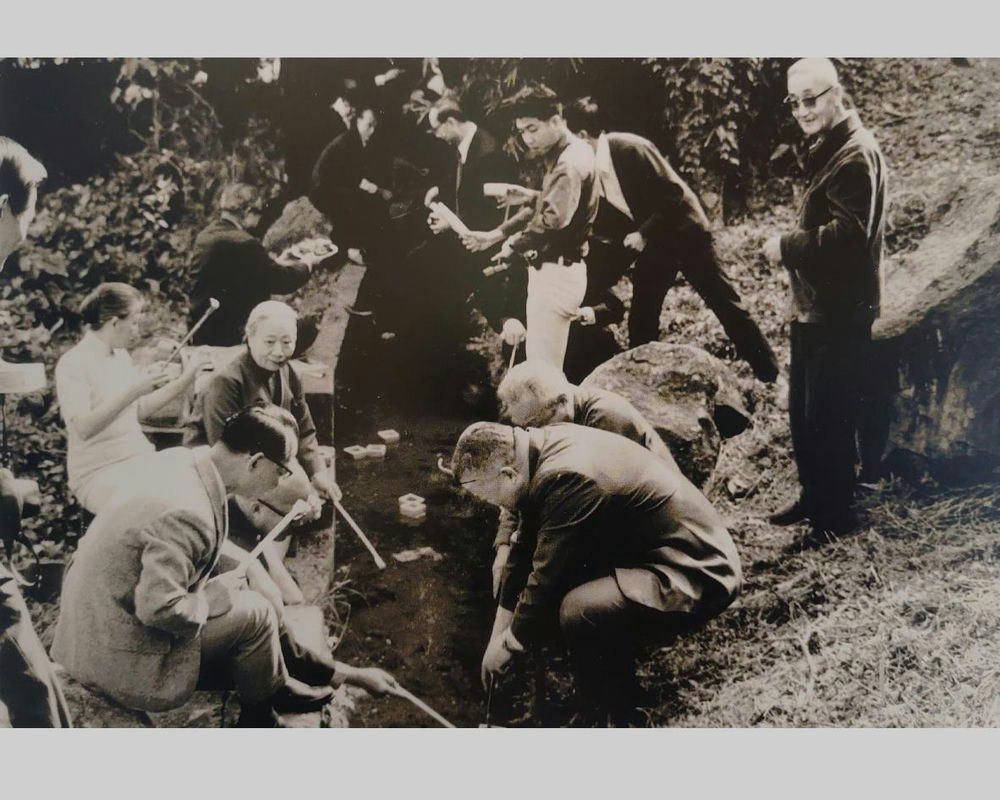
A scene at the 1973 Hsiu-hsi gathering in Taipei. Photograph courtesy Mr. Chuang Ling
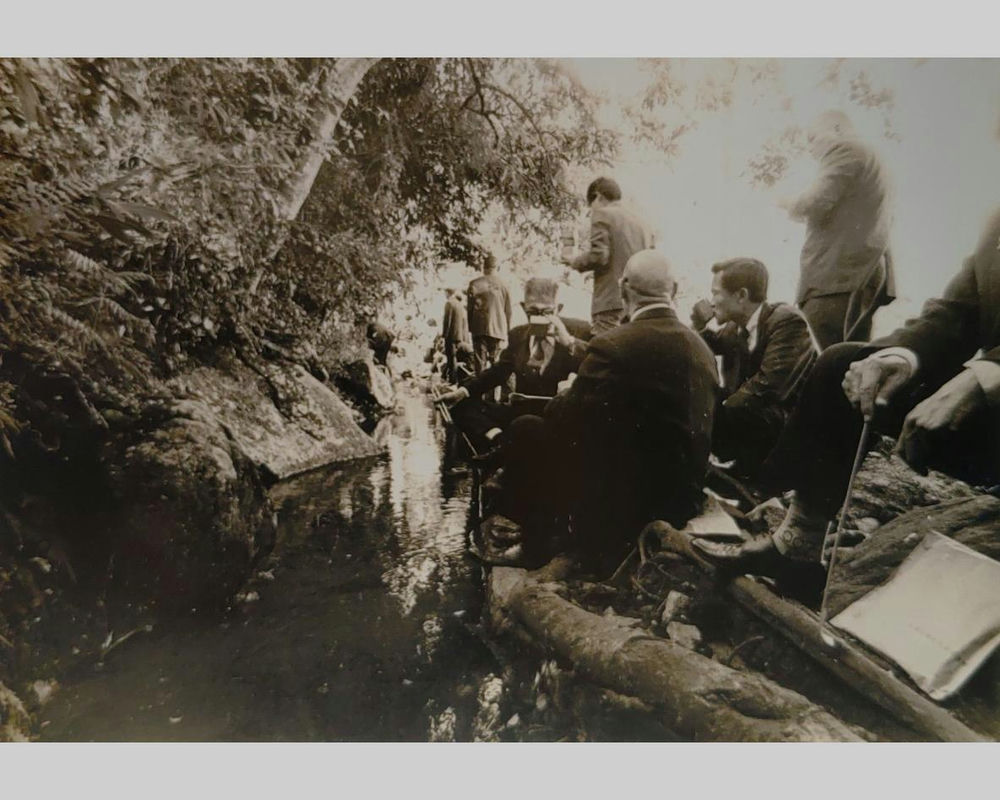
Second scene at the 1973 Hsiu-hsi gathering in Taipei. Photograph courtesy Mr. Chuang Ling
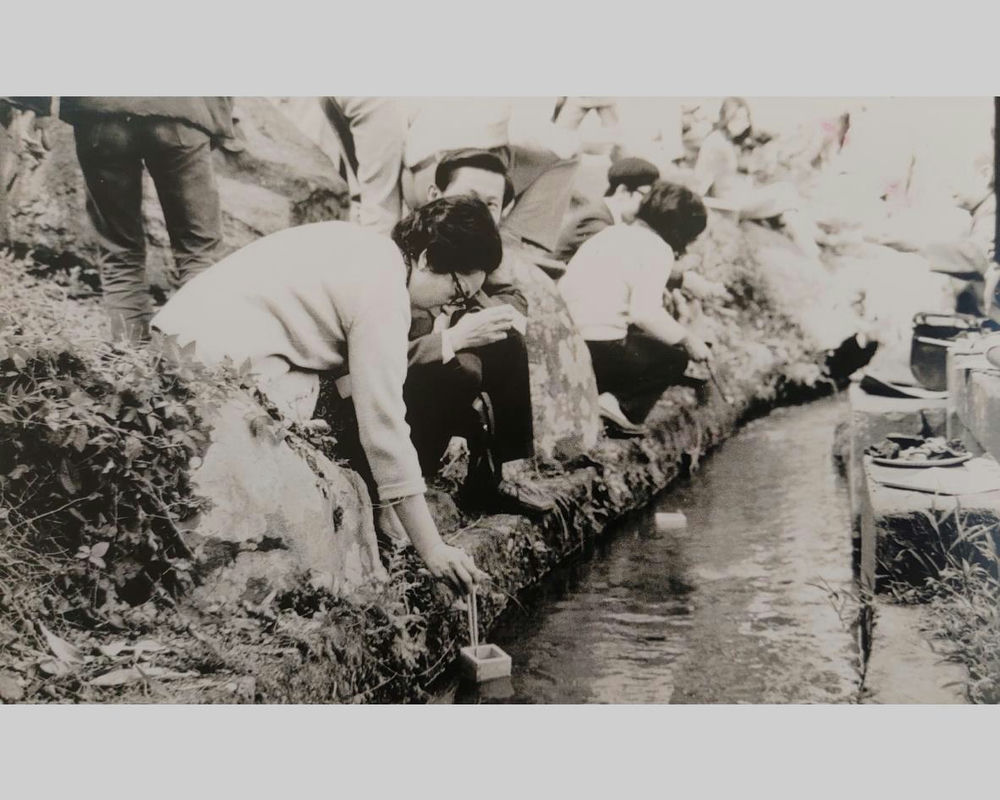
Third scene at the 1973 Hsiu-hsi gathering in Taipei. Photgraph courtesy Mr. Chuang Ling
The distinguished scholar Ch’ien Mu (錢穆 1895-1990) said: “For those who know a bit about the history of their own country, it certainly follows that there will be a kind of warmth and respect towards their own national history.” I visited Lan-ch’u of Shao-hsing before, on that day, only a handful were in the garden. As for the refined gatherings of the literati who migrated to Taiwan, they have long been forgotten, not to mention a gathering of Liang Ch’i-Chao.
One who is passionate about Chinese culture, must also be one who is exceptionally patriotic. I am full of admiration for my friend Shu Kong, whose patriotism is an emanation of his cultural heritage.
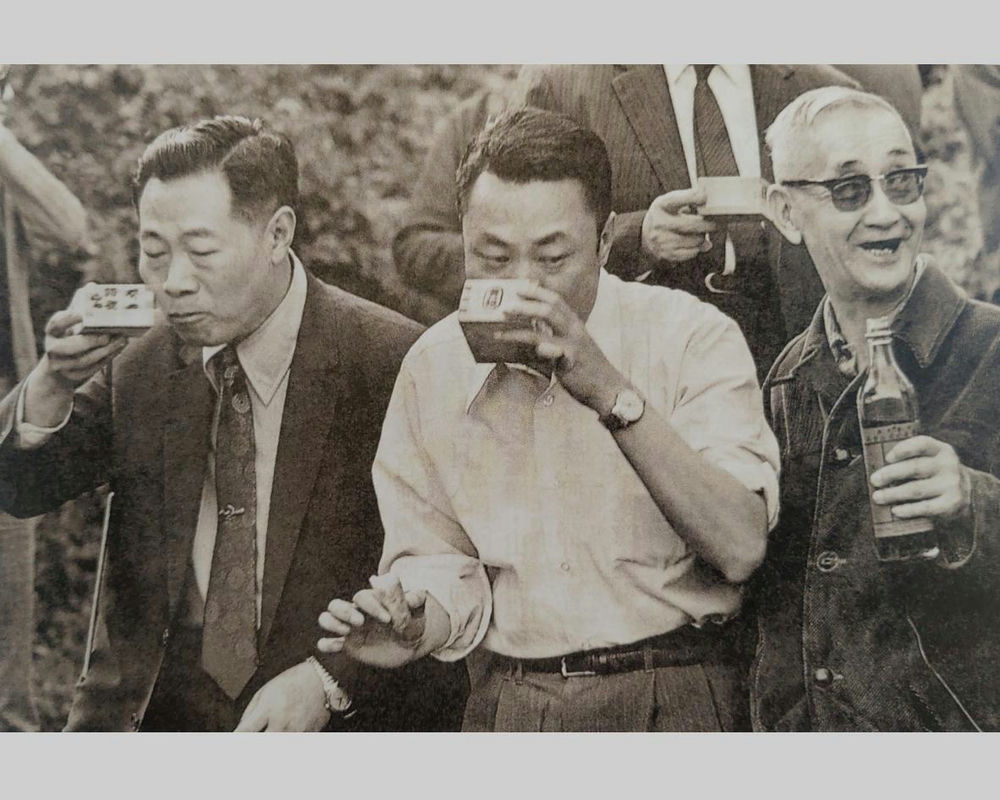
Chuang Yen holding a bottle of wine at the 1973 Hsiu-hsi gathering in Taipei. Photograph courtesy Mr. Chuang Ling
Related Contents:
Liang Ch'i-chao (梁啟超) and the Garden of Myriad Lives Gathering
